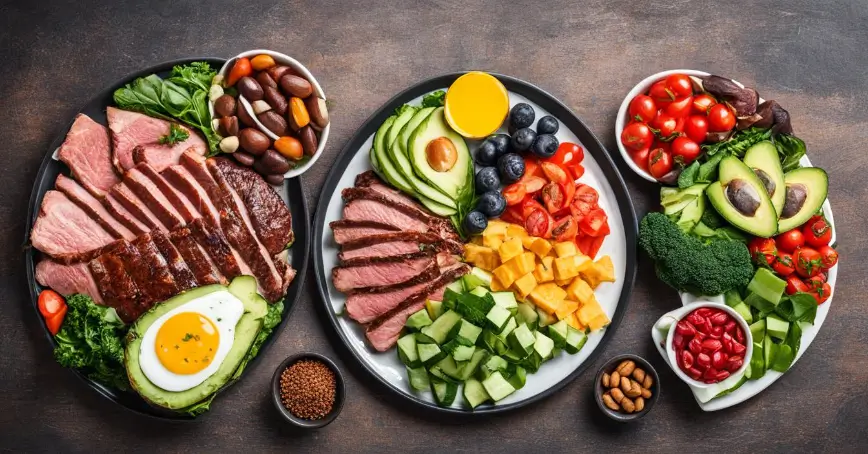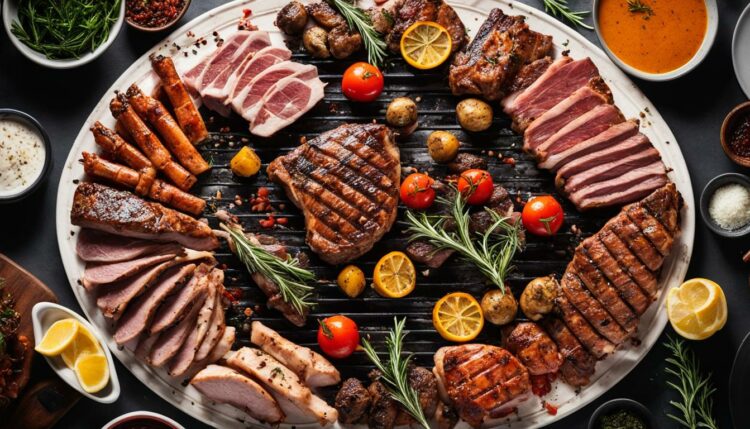The carnivore diet has gained popularity in recent years as a highly restrictive eating approach that involves consuming only animal products, eliminating all plant foods. This ultimate guide aims to provide a comprehensive overview of the carnivore diet, including its benefits, risks, and potential results.
In this guide, we will explore the best carnivore diet foods that can be incorporated into a carnivore meal plan. Whether you’re already following the carnivore diet or considering giving it a try, understanding which foods are allowed and which are not is essential for success.
Key Takeaways:
- The carnivore diet eliminates all plant foods and focuses solely on animal products.
- Following the carnivore diet may lead to rapid fat loss, reduced inflammation, and improved autoimmune-related symptoms.
- However, there are potential risks and downsides to consider, such as increased saturated fat intake and the risk of nutrient deficiencies.
- A comprehensive carnivore diet food list can help you plan your meals and ensure you’re getting the necessary nutrients.
- Consulting with a healthcare professional is recommended before starting the carnivore diet to ensure it is suitable for your individual needs and goals.
What is the Carnivore Diet?
The carnivore diet is a dietary approach that involves exclusively consuming animal products and eliminating all plant foods. This means the diet consists mainly of meat, fish, eggs, and some dairy products.
Proponents of the carnivore diet claim that it can lead to rapid fat loss, reduced inflammation, improved autoimmunity, and digestive health. By focusing on animal-based foods, they believe that the body thrives on a high-protein, high-fat diet while avoiding potential allergens and irritants found in plant foods.
However, the elimination of plant foods raises concerns about potential nutrient deficiencies and long-term health effects. It is important to note that the carnivore diet is highly restrictive and may not provide all the essential nutrients, vitamins, and minerals that the body needs for optimal functioning.
The Controversy Surrounding the Carnivore Diet
While some individuals have reported positive results and improvements in their health on the carnivore diet, the scientific community remains divided on its efficacy and safety.
“Evidence supporting the carnivore diet is limited and often anecdotal. More research is required to fully understand the long-term effects and potential risks associated with this extreme eating approach.”
By completely eliminating plant foods from the diet, individuals on the carnivore diet may miss out on important nutrients such as fiber, phytonutrients, vitamins, and minerals that are predominantly found in fruits, vegetables, and whole grains.
Moreover, the long-term health effects of consuming a high amount of animal products, particularly red and processed meats, are still uncertain. Some studies have linked high consumption of these foods to an increased risk of heart disease and certain types of cancer.
It is crucial to consult with a healthcare professional or registered dietitian before considering the carnivore diet to ensure that it aligns with your individual health goals and overall nutritional needs.
Science-backed Benefits of Following a Carnivore Diet
While scientific research specifically on the carnivore diet is limited, there are several potential benefits that may be associated with following this eating approach. These include:
- Promoting Fat Loss and Muscle Preservation: The high protein content of the carnivore diet can aid in fat loss while preserving lean muscle mass. Protein has a high thermic effect, meaning it takes more energy for the body to digest, thus increasing the calorie burn.
- Reducing Inflammation: Some people report a reduction in inflammation when following the carnivore diet. This may be due to the elimination of potential allergens found in plant foods, such as gluten or lectins.
- Improving Autoimmune-related Symptoms: Certain autoimmune conditions, such as rheumatoid arthritis or celiac disease, may benefit from the removal of potential trigger foods found in plant-based diets.
- Alleviating Digestive Issues Triggered by Plant Foods: For individuals with gut-related issues like irritable bowel syndrome or small intestinal bacterial overgrowth (SIBO), the carnivore diet may provide relief by eliminating hard-to-digest plant fibers.
- Promoting Ketosis: Due to the very low carbohydrate intake of the carnivore diet, the body often enters a state of ketosis, in which it uses ketones derived from fat as an alternative fuel source.
It’s important to note that these benefits are based on anecdotal reports and individual experiences. Further research is needed to fully understand the long-term effects and potential risks of the carnivore diet.

Scientific Research on the Carnivore Diet
While there is limited scientific research specifically on the carnivore diet, some studies have explored the potential benefits of low-carbohydrate, high-protein diets.
For example, a 2014 study published in the Annals of Internal Medicine found that a low-carbohydrate diet led to greater improvements in body composition and cardiovascular risk factors compared to a low-fat diet. However, it’s important to recognize that these studies did not exclusively focus on the carnivore diet and included a broader range of dietary approaches.
| Benefit | Scientific Evidence |
|---|---|
| Promoting Fat Loss and Muscle Preservation | Limited evidence suggests that high-protein diets can aid in fat loss and muscle preservation (1). |
| Reducing Inflammation | Anecdotal reports suggest that the elimination of potential allergens found in plant foods may reduce inflammation (2). |
| Improving Autoimmune-related Symptoms | No specific studies on the carnivore diet, but anecdotal reports suggest potential improvements in symptoms (3). |
| Alleviating Digestive Issues Triggered by Plant Foods | Limited evidence supports the use of low-FODMAP diets (which eliminate fermentable fibers) for alleviating digestive issues (4). |
| Promoting Ketosis | The very low carbohydrate content of the carnivore diet can induce ketosis (5). |
It’s important to approach these benefits with caution and consult with a healthcare professional before making any drastic dietary changes.
Downsides and Concerns of the Carnivore Diet
Despite the potential benefits associated with the carnivore diet, it is important to consider the risks and downsides before adopting this highly restrictive eating approach.
Increased Risk of Heart Disease: One major concern of the carnivore diet is the higher intake of saturated fats from animal products. Consuming excessive amounts of saturated fats can increase the risk of heart disease and other cardiovascular conditions.
Nutrient Deficiencies: By eliminating plant foods, the carnivore diet may lead to nutrient deficiencies, particularly in essential vitamins and minerals that are mainly found in fruits, vegetables, and whole grains. These nutrients play a critical role in maintaining overall health and preventing deficiencies.
Impact on Gut Health and Digestive Issues: The lack of fiber in the carnivore diet can negatively impact gut health and increase the risk of digestive issues such as constipation and diarrhea. Fiber is essential for maintaining a healthy digestive system and promoting regular bowel movements.
“While the carnivore diet may offer certain benefits, it is crucial to address the potential risks and downsides associated with the elimination of plant foods. It is always recommended to consult with a healthcare professional before making any significant dietary changes.”
Considering these potential risks and downsides, it is important for individuals to carefully evaluate their health status and nutritional needs before incorporating the carnivore diet into their lifestyle.
Comparison of Key Concerns
| Concerns | Carnivore Diet | Suggested Solutions |
|---|---|---|
| Increased risk of heart disease | Higher intake of saturated fats from animal products | Limit intake of fatty cuts of meat and opt for leaner options. Include sources of unsaturated fats such as fish, nuts, and seeds. |
| Nutrient deficiencies | Lack of fruits, vegetables, and whole grains | Consider supplementation under the guidance of a healthcare professional. Ensure variety in animal product choices and seek nutrient-dense options. |
| Impact on gut health and digestive issues | Lack of fiber from plant foods | Include low-carb, fiber-rich vegetables such as leafy greens. Monitor bowel movements and seek medical advice if issues persist. |
Carnivore Diet Food List
The carnivore diet is a unique eating approach that focuses on consuming animal products while eliminating all plant foods. If you’re considering adopting the carnivore diet, it’s important to understand what foods are approved and suitable for this eating plan. Below is a comprehensive list of carnivore diet approved foods:
Meat
- Beef (including organ meats like liver)
- Pork
- Lamb
- Poultry (chicken, turkey, duck)
- Game meats (venison, bison)
Fish and Seafood
- Salmon
- Tuna
- Mackerel
- Shrimp
- Shellfish (clams, mussels, crab, lobster)
Eggs
- Chicken eggs
- Duck eggs
- Quail eggs
Dairy (Low-Lactose Products)
- Butter
- Ghee
- Cheese (hard cheeses like cheddar, feta, and gouda)
- Heavy cream
- Sour cream
It’s important to note that the carnivore diet strictly excludes fruits, vegetables, grains, legumes, and nuts. These foods are considered non-compliant with the carnivore diet’s principles.
To get a better understanding of the carnivore diet food list, refer to the table below:
| Approved Foods | Avoided Foods |
|---|---|
| Meat (beef, pork, lamb, poultry, game meats) | Fruits |
| Fish and Seafood (salmon, tuna, mackerel, shrimp, shellfish) | Vegetables |
| Eggs | Grains |
| Dairy (butter, ghee, cheese, heavy cream, sour cream) | Legumes |
| Nuts |
As you can see, the carnivore diet focuses on a limited range of animal-based foods, providing a protein-rich and low-carbohydrate eating approach.
Carnivore Diet Meal Plan and Recipes
Creating a meal plan while following the carnivore diet can be a challenge due to the restriction of consuming only animal products. However, with some creativity and variety, it is possible to enjoy a satisfying carnivore diet meal plan and explore different recipes.
Here are some carnivore diet meal ideas to help you plan your meals:
Breakfast:
- Scrambled eggs cooked in butter or lard
- Bacon or sausage
- Beef or pork steak
Lunch:
- Grilled chicken breast
- Salmon fillet
- Beef burger patties (without buns)
Dinner:
- Ribeye steak
- Lamb chops
- Pork chops
Snacks:
- Hard-boiled eggs
- Beef jerky
- Bone broth
Remember to choose high-quality, grass-fed, and organic animal products whenever possible to ensure optimal nutrition. Also, experiment with different cooking methods like grilling, broiling, or pan-frying to add variety to your meals.
The carnivore diet may seem limiting at first, but it can be a rewarding way of eating for those who enjoy animal-based foods. When planning your carnivore diet meals, focus on incorporating a variety of protein sources, including beef, poultry, fish, and dairy.
Don’t forget to consult with a healthcare professional or a registered dietitian to ensure you are meeting your nutritional needs while following this eating approach.
Now let’s take a look at some delicious carnivore diet recipes that you can try:
| Recipe Name | Ingredients | Instructions |
|---|---|---|
| Steak with Herb Butter | Ribeye steak, grass-fed butter, fresh herbs, salt, pepper |
|
| Baked Salmon with Lemon and Dill | Salmon fillet, lemon slices, fresh dill, salt, pepper |
|
| Beef Burger Lettuce Wraps | Ground beef, lettuce leaves, salt, pepper, optional toppings (cheese, bacon, avocado) |
|
Carnivore Diet vs. Keto
The carnivore diet and the ketogenic (keto) diet both involve restricting carbohydrate intake, but they have significant differences in their approach and permitted foods.
The carnivore diet is an extremely restrictive eating plan that eliminates all plant foods and focuses exclusively on animal products. This includes meat, fish, eggs, and some low-lactose dairy products. By eliminating carbohydrates entirely, proponents of the carnivore diet believe it can lead to rapid fat loss, reduced inflammation, improved autoimmune health, and better digestive function.
On the other hand, the keto diet is a low-carb, high-fat diet that allows for the consumption of a wider range of foods. The primary goal of the keto diet is to induce ketosis, a metabolic state where the body uses fat as its primary fuel source instead of carbohydrates. While the carnivore diet focuses mainly on animal products, the keto diet includes a moderate intake of protein-rich foods, a higher intake of fats, and a limited amount of carbohydrates.
To summarize:
| Carnivore Diet | Keto Diet |
|---|---|
| Excludes all plant foods | Allows some plant foods in moderation |
| Emphasizes high intake of animal products | Focuses on high-fat foods |
| Limits carbohydrate intake to zero | Limits carbohydrate intake to induce ketosis |
| May lead to nutrient deficiencies with prolonged adherence | Requires careful planning to meet nutritional needs |
While both diets involve carbohydrate restriction, the carnivore diet takes a more extreme approach by eliminating all plant foods entirely. On the other hand, the keto diet allows for a broader range of food options, focusing on high-fat and moderate-protein intake in addition to carefully managing carbohydrate intake to achieve ketosis.
It’s essential to consider the potential risks, such as nutrient deficiencies, associated with the carnivore diet and the need for careful planning to ensure adequate nutrient intake on the keto diet.

Conclusion
The carnivore diet is a highly controversial eating approach that has gained attention for its exclusive consumption of animal products and complete elimination of plant foods. While some individuals may experience benefits such as weight loss, reduced inflammation, and improved digestion, it is crucial to acknowledge the potential risks and nutrient deficiencies associated with this highly restrictive diet.
Adopting a carnivore diet requires careful consideration and consultation with a healthcare professional, as the elimination of plant foods raises concerns about nutrient deficiencies, particularly in vitamins, minerals, and dietary fiber. Plant-based foods provide essential nutrients and play a vital role in overall health and disease prevention.
Before embarking on the carnivore diet, it is important to assess its suitability for your individual needs and goals. Consulting with a healthcare professional can provide valuable guidance and ensure that any potential risks are minimized. Additionally, it is prudent to monitor your health regularly and make any necessary adjustments to optimize the benefits and mitigate the drawbacks of this controversial eating approach.
FAQ
What is the carnivore diet?
The carnivore diet is a dietary approach that involves exclusively consuming animal products and eliminating all plant foods.
What are the potential benefits of following a carnivore diet?
Potential benefits of the carnivore diet include promoting fat loss, reducing inflammation, improving autoimmune-related symptoms, alleviating digestive issues triggered by plant foods, and promoting ketosis.
What are the downsides and concerns of the carnivore diet?
Downsides and concerns of the carnivore diet include an increased risk of heart disease due to higher intake of saturated fats, potential nutrient deficiencies from the lack of plant foods, and the impact on gut health due to the lack of fiber.
What foods are allowed on the carnivore diet?
The carnivore diet primarily consists of animal products such as meat, fish, eggs, and some low-lactose dairy products. Fruits, vegetables, grains, legumes, and nuts are strictly avoided.
How can I create a meal plan on the carnivore diet?
This section will provide meal ideas and recipes that adhere to the carnivore diet guidelines, offering variety and satisfaction while following the diet.
What are the differences between the carnivore diet and the keto diet?
While both diets involve restricting carbohydrate intake, the carnivore diet eliminates plant foods entirely, while the keto diet focuses on high-fat, moderate-protein, and low-carb foods.
Is the carnivore diet recommended for everyone?
Before starting the carnivore diet, it is recommended to consult with a healthcare professional to ensure that it is suitable for your individual needs and goals.




